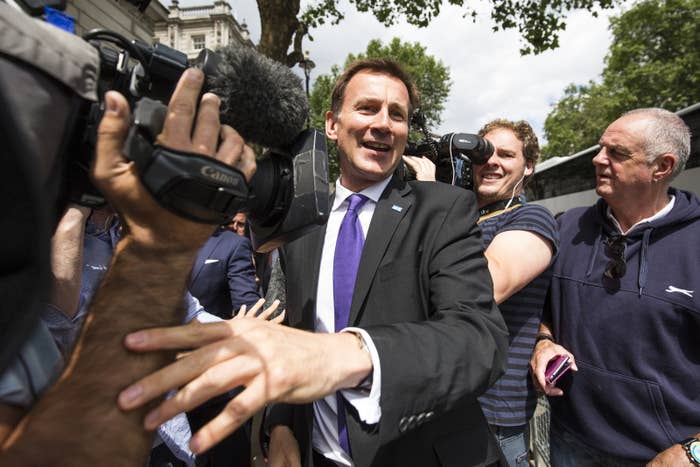
Junior doctors will stage four five-day walkouts every month for the rest of the year, it has been announced.
In addition to the already-announced full withdrawal of labour between 12-16 September, junior doctors will strike for three further five-day periods in October (5-7 and 10-11), November (14-18) and December (5-9).
The decision was made following a special meeting of the British Medical Association (BMA) council on Thursday.
In a statement, the BMA called on health secretary Jeremy Hunt to reverse his decision to impose the new junior doctors contract at the heart of the dispute, and restart talks.
"We believe that progress was made during talks in May, so we are calling for the government to lift the imposition and restart meaningful talks to agree a contract that is adequately funded, fit for purpose, delivers for patients and has the confidence of the profession," the statement said.
"Despite our efforts to work with the secretary of state to resolve this dispute, the government has failed to listen, leaving us with no option but to take more industrial action."

Earlier, Hunt appeared to draw parallels between himself and the founder of the NHS, Nye Bevan, as he said he had no intention of stepping down as health secretary after it was announced junior doctors would strike for the sixth time this year.
Speaking to BBC Radio 4's Today programme, Hunt said the strike would be "absolutely devastating" for patients and could lead to the cancellation of 100,000 operations and the postponement of a million hospital appointments.
Prior to this year junior doctors had not gone on strike for 40 years, but Hunt said he was not thinking of resigning over his handling of the dispute.
“Nye Bevan, the founder of the NHS, was described by the BMA as a medical führer," he said.
"Health secretaries are rarely popular in their job but what matters is are you doing the right thing for patients.”

Hunt said the new contract, which aims to restructure working hours and pay in order for hospitals to schedule more junior doctors at weekends, would deliver the Conservative party's 2015 manifesto commitment of a "truly seven-day NHS".
But junior doctors say that because they already work some weekends, they will be paid less as a result. And as the size of the workforce is not being increased, there are also worries wards will be stretched further during the week.
Shadow health secretary Diane Abbott said the latest strike action, approved by the BMA council, showed the "crisis in the NHS is deepening".
"The government is not properly funding even a five-day NHS. A seven-day NHS is simply impossible without more resources," she said.
"It is not too late to change course. Jeremy Hunt should stop posturing about imposing a junior doctors contract, scrap it, and re-enter talks."
Jeremy Hunt on @BBCr4today compares himself to Nye Bevan. Ridiculous. Bevan set up the NHS. Hunt is dismantling it
Hunt has previously said he intends to impose the new contract in the autumn, despite junior doctors rejecting proposals from the BMA itself to accept an amended version of the contract earlier in the summer.
"People will rightly ask themselves why the BMA, who championed this deal as a good deal for doctors, a good deal for patients, only in May, are now saying it’s such a bad deal that they want to inflict the worst doctors strike in NHS history on patients," he said in response to the latest strike action.
Since 58% of junior doctors voted to reject the amended contract there has been a change of leadership in the BMA's junior doctors committee.
The new committee chair, Ellen McCourt, said the strike in September would be called off if Hunt cancelled the imposition of the contract and returned to talks.
"This is not a situation junior doctors wanted to find themselves in," she said.
"We want to resolve this dispute through talks, but in forcing through a contract that junior doctors have rejected and which they don’t believe is good for their patients or themselves, the government has left them with no other choice."
In a statement issued after the initial five-day strike was announced and before the three further walkouts were revealed, Neena Modi, president of the Royal College of Paediatrics and Child Health said the college was "well aware that no doctor will resort to strike action without very careful reflection and, as with any decision affecting patient care, without weighing all considerations in the balance."
The statement continued: "We recognise the frustration and anger of junior doctors at the continuing discredited use of '7-day service delivery' to impose a rejected contract. We repeat our previous call to the secretary of state for health to withdraw the planned contract imposition and return to discussions that truly reflect a desire to place patient care first and foremost."
UPDATE
Medical leaders have criticised the forthcoming strikes as a disproportionate response.
In a statement the Academy of Medical Royal Colleges said it was "disappointed at the prospect of further sustained industrial action by junior doctors."
"We are acutely aware that the NHS is under extreme pressure at the moment. Patient safety and quality of care must be the priority," the academy said.
"We know there are genuine concerns about the contract and working arrangements, but we do not consider the proposed strikes are proportionate. Five days of strike action, particularly at such short notice, will cause real problems for patients, the service and the profession."
